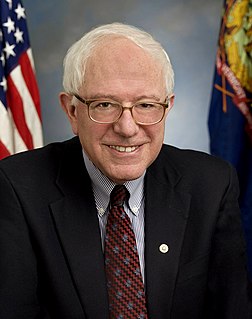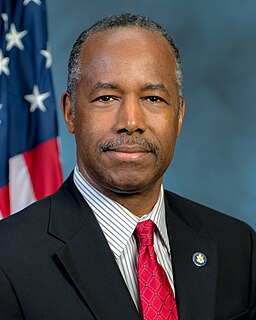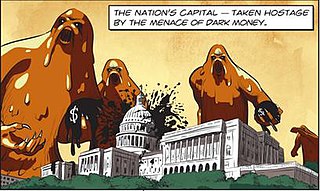This article needs to be updated.(July 2016) |
Fundraising plays a central role in many presidential campaigns, and is a key factor [1] (others include endorsements/messaging/visits/staffers) [2] in determining the viability of candidates. Money raised is applied for the salaries of non-volunteers in the campaign, transportation, campaign materials, media advertisements and other contingencies. Under United States law, officially declared candidates are required to file campaign finance details with the Federal Elections Commission (FEC) at the end of every calendar month or quarter. Summaries of these reports are made available to the public shortly thereafter, revealing the relative financial situations of all the campaigns.

Advertising is a marketing communication that employs an openly sponsored, non-personal message to promote or sell a product, service or idea. Sponsors of advertising are typically businesses wishing to promote their products or services. Advertising is differentiated from public relations in that an advertiser pays for and has control over the message. It differs from personal selling in that the message is non-personal, i.e., not directed to a particular individual. Advertising is communicated through various mass media, including traditional media such as newspapers, magazines, television, radio, outdoor advertising or direct mail; and new media such as search results, blogs, social media, websites or text messages. The actual presentation of the message in a medium is referred to as an advertisement, or "ad" or advert for short.
Contents
- 4th Quarter 2015
- 3rd Quarter 2015
- 2nd Quarter 2015
- 1st Quarter 2015
- See also
- References
- External links
However, because of relatively recent changes to campaign finance laws (especially Citizens United v. FEC and McCutcheon v. FEC among others), the fundraising by nominally independent committees will be especially [3] important in 2015 and 2016, perhaps outstripping money raised by the officially declared campaigns. [4] Candidates not currently holding elected office, including Martin O'Malley, [5] Jeb Bush, [6] Scott Walker, [5] and Rick Santorum [5] made their official campaign announcements relatively later than is usual in presidential elections, instead concentrating on their fundraising vehicles, which can collect unlimited sums. By contrast, other candidates including Ted Cruz, Rand Paul, and Marco Rubio were some of the earliest candidates to announce, because as sitting federal Senators they are constrained by campaign-finance limits with regard to nominally independent groups whether or not they are officially declared. All three of these candidates have leadership PACs; many of the nominally independent outside groups are also 501(c)(3) and/or 501(c)(4) organizations, which are legally distinct from 527 organizations (which themselves have many variations). Many campaigns are using at two or three or four legal entities for fundraising; some campaigns, such as those of Ben Carson, Ted Cruz, and Rick Perry, are utilizing multiple fundraising vehicles of the same (legal) category, to permit donors more fine-grained control over how their money is utilized. Outside spending is expected to play a much larger role in 2016, than it did in 2012, which was the first presidential election after the landmark 2010 decision. [4]
Citizens United v. Federal Election Commission, 558 U.S. 310 (2010), is a landmark U.S. constitutional law, campaign finance, and corporate law case dealing with regulation of political campaign spending by organizations. The United States Supreme Court held (5–4) on January 21, 2010, that the free speech clause of the First Amendment to the Constitution prohibits the government from restricting independent expenditures for communications by nonprofit corporations, for-profit corporations, labor unions, and other associations.
McCutcheon v. Federal Election Commission, 572 U.S. 185 (2014), is a landmark campaign finance decision of the United States Supreme Court. The decision held that Section 441 of the Federal Election Campaign Act (FECA), which imposed a limit on contributions an individual can make over a two-year period to national party and federal candidate committees, is unconstitutional.

Martin Joseph O'Malley is an American politician and attorney who served as the 61st Governor of Maryland from 2007 to 2015. He previously served as Mayor of Baltimore from 1999 to 2007, and was a councilman from the Third Council District in the northeast section of the city on the Baltimore City Council from 1991 to 1999.
As of July 2015, early fundraising totals for the candidates in the 2016 race have ranged from the millions of dollars to over a hundred million dollars. According to Republican National Committee member Henry Barbour of Mississippi, although some candidates will raise over $50 million during the course of 2015, in order to be competitive candidates will need to raise at least $10 million to $15 million during the course of 2015 (prior to the caucus and primary elections in early 2016). [7] As of July 2015, candidates for the Democratic Party who have already raised at least $10 million include Hillary Clinton and Bernie Sanders, with Martin O'Malley coming in a distant third with approximately $2 million. [8] Also as of July 2015, candidates for the Republican Party who have already raised at least $10 million include Jeb Bush, Ted Cruz, Marco Rubio, Rick Perry, Rand Paul, [9] John Kasich, Chris Christie, and Ben Carson. [8] Numbers for Scott Walker were not yet disclosed as of mid-July. [8] Coming in 9th place and above (or 8th place and above if Walker is elided) was Bobby Jindal with ~$9m, Mike Huckabee with ~$8m, and Carly Fiorina with ~$5m. [8] Finally, although Donald Trump raised ~$2m dollars from his campaign-announcement in mid-June through the end of the reporting period on June 30, 2015, he has a personal net worth in the billions of dollars, and has stated he will self-finance his campaign. [10]

The Republican National Committee (RNC) is a U.S. political committee that provides national leadership for the Republican Party of the United States. It is responsible for developing and promoting the Republican political platform, as well as coordinating fundraising and election strategy. It is also responsible for organizing and running the Republican National Convention. Similar committees exist in every U.S. state and most U.S. counties, although in some states party organization is structured by congressional district, allied campaign organizations being governed by a national committee. Ronna Romney McDaniel is the current committee chairwoman.

Hillary Diane Rodham Clinton is an American politician, diplomat, lawyer, writer, and public speaker. She served as the First Lady of the United States from 1993 to 2001, U.S. Senator from New York from 2001 to 2009, 67th United States Secretary of State from 2009 to 2013, and as the Democratic Party's nominee for President of the United States in the 2016 election, the first woman nominated by a major party.

Bernard Sanders is an American politician who has served as the junior United States Senator from Vermont since 2007. The longest-serving Independent in congressional history, he was elected to the U.S. House of Representatives in 1990 and caucuses with the Democratic Party, enabling his appointment to congressional committees and at times giving Democrats a majority.







